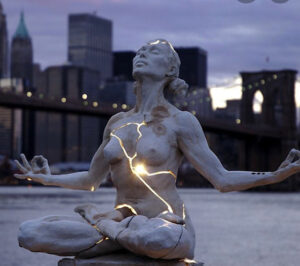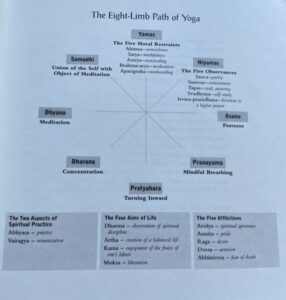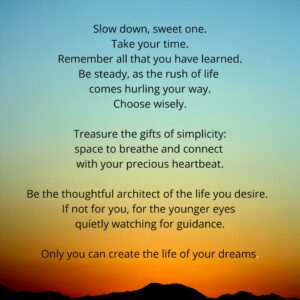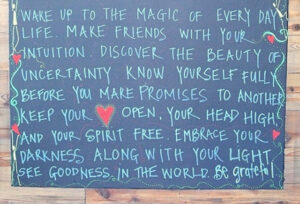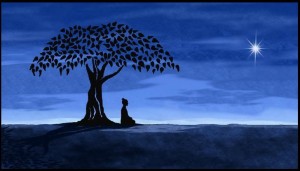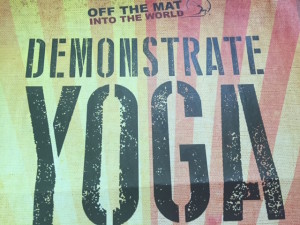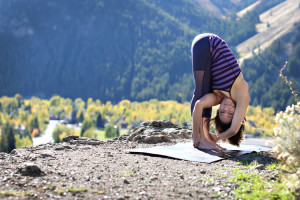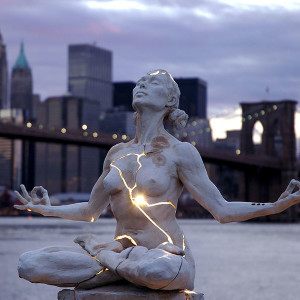Yoga
Authentic Attitudes
December 5, 2021Advent, which means ‘coming’ in Latin, is typically a season of waiting, listening, and preparing to celebrate the mystery of God with us, Immanuel. It is also a season that challenges our sense of well-BEing. Cultivating a right attitude about the days leading up to the holidays will help us stay true to our authentic self, our true nature as people who have heard the sacred teachings and are walking the path.
Y
O
G
A
[Image: Rolph Gates]
The practice brings awareness of more than our bodies through the asanas…the postures…it attunes us to our thoughts, which in turn shape our attitudes. In our faith-based yoga practice we cultivate an openness to encounter God, Spirit, Gaia–truth & love–infinitely more fulfilling path of h o p e, p e a c e, and l o v e.
-Cindy Senarighi and Heidi Green
By your stumbling, the world is perfected.
Sri Aurobindo
“When he sees all beings as equals in suffering or in joy because they are like himself, than man has grown perfect in YOGA.”
-Bhagavad Gita
Union.
October Yoga in Sun Valley!
September 29, 2019Cathie Caccia October Yoga Workshop
~
Last year’s workshop sold out; special rates available to stay at the Limelight, too.
Tilted towards the sun.
June 21, 2018There’s an urgency to this moment. We must choose between a world of subjects and a world of objects.
In his book Carpe Jugulum, Terry Pratchett has a character define sin thusly: “Sin, young man, is when you treat people like things.”
We’re seeing the consequences of this everywhere these days: People are being objectified.
St. Gregory of Nyssa (c. 335-c. 394) offered a beautiful, succinct, and useful definition of sin. Sin, he [suggested], is a refusal to keep growing.
Namaste asks something huge of us: If the divinity in me recognizes the divinity in you, how could I abuse, debase, violate, or harass? I would, after all, only be punishing myself.
Here we have an antidote to objectification. Something infinite, immortal, mysterious, loving, and alive abides in me and it is from this light that I bow toward that which is infinite, immortal, mysterious, loving, and alive in you. What if this was our set-point, our baseline, the fundamental assumption we had about every single person we encountered? All our reputations precede us: We’re divine.
Mystics from every tradition testify to the aliveness and sentience of all things, that the natural world is lit up with the flame of divinity. This does and must include us. We’re not taught this. In fact, most of what we’re taught opposes this.
A world of objects is a kind of hell. A world of subjects—divine beings honoring the divinity in the other—is surely heaven. May we point our feet toward this heaven and begin the hard and necessary work of walking there.
[Richard Rohr, Center for Action]
join.
September 12, 2016Off the Mat ~ Into the World
July 29, 2016‘Yoga is a tool for change. Rooted in compassion and connection, we are called to awaken to suffering and take action in response, creating peaceful, just, and connected global community. How will you take your yoga off the mat and into the world?’
Ahimsa in action.
February 8, 2016The Yoga Sutra is not presented in an attempt to control behavior based on moral imperatives. The sutras don’t imply that we are “bad” or “good” based upon our behavior, but rather that if we choose certain behavior we get certain results. If you steal, for example, not only will you harm others, but you will suffer as well.
The first yama is perhaps the most famous one: ahimsa, usually translated as “nonviolence.” This refers not only to physical violence, but also to the violence of words or thoughts. What we think about ourselves or others can be as powerful as any physical attempt to harm. To practice ahimsa is to be constantly vigilant, to observe ourselves in interaction with others and to notice our thoughts and intentions. Try practicing ahimsa by observing your thoughts when a smoker sits next to you. Your thoughts may be just as damaging to you as his cigarette is to him.
It is often said that if one can perfect the practice of ahimsa, one need learn no other practice of yoga, for all the other practices are subsumed in it. Whatever practices we do after the yamas must include ahimsa as well. Practicing breathing or postures without ahimsa, for example, negates the benefits these practices offer.
http://www.yogajournal.com/article/yoga-101/beginning-journey/
Tree of life.
December 1, 2015Yoga…for Free
July 17, 2015SATURDAY
8:45-9:45am Soul Salutations
FREE outside at Sun Valley
July 18 at Base of River Run
July 25 at Base of River Run
August 1 at Base of River Run
August 8 at Sun Valley Village Lawn
August 15 at Sun Valley Village Lawn
August 22 at Sun Valley Village Lawn
August 29 at Base of River Run
